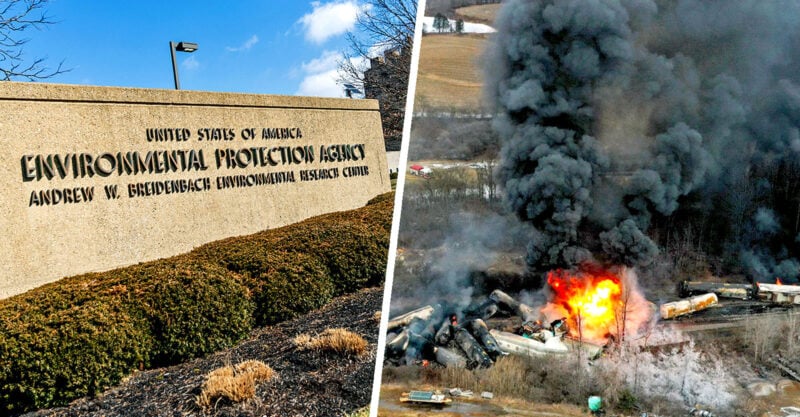Miss a day, miss a lot. Subscribe to The Defender's Top News of the Day. It's free.
By Shannon Kelleher
Environmental leaders gathered at the steps of the U.S. Environmental Protection Agency (EPA) headquarters in Washington, D.C., on July 27 to call for a ban on toxic vinyl chloride, a cancer-causing chemical that gained scrutiny after a massive plume spread through East Palestine, Ohio, after a train derailment in February.
The groups unveiled a petition signed by more than 27,000 people that calls on the EPA to protect vulnerable communities by banning vinyl chloride, which is used to make polyvinyl chloride (PVC) plastic for drinking water pipes, packaging and children’s toys.
The incident in East Palestine led to the spread of more than 100,000 gallons of vinyl chloride after officials instigated a “controlled burn” as a strategy to try to prevent a dangerous explosion following the train derailment, a move that may have been unnecessary.
The incident offered a “chilling warning” that the public must act now to keep communities safe from “petrochemical” products made from petroleum or natural gas, Heather McTeer Toney, executive director of the Beyond Petrochemicals campaign, said outside the EPA building.
While the EPA banned vinyl chloride in refrigerants, aerosol propellants, drugs and cosmetics in 1974, for decades the chemicals have remained in other household plastic items.
Short-term exposure to vinyl chloride can cause dizziness, drowsiness and headaches, according to the EPA’s website — symptoms residents of East Palestine reported.
Breathing in vinyl chloride over long periods of time has been shown to increase the risk of a rare form of liver cancer, the agency reports. Research also suggests infants and young children might be especially susceptible to cancer caused by vinyl chloride exposure.
Vinyl chloride in PVC forms highly toxic chemicals called dioxins when it burn, posing a health risk to firefighters.
“We’re here today for one reason and one reason only — to tell the EPA that it’s time now,” said Daniel Winston, co-executive director of the group River Valley Organizing who lives 17 miles from the site of the East Palestine derailment.
“We can’t wait to ban vinyl chloride. You can’t slow-walk this. The livelihoods of Americans are dependent on the EPA doing their job and banning things that are giving people cancer.”
The EPA has developed national standards to minimize vinyl chloride emissions during production, which state:
“These rules were developed to protect public health by minimizing the health risks to the people living in the vicinity of these plants and to any additional people who are exposed as a result of new construction.”
Some major companies are working ahead of regulators to voluntarily turn away from PVC. The U.S. Plastics Pact, which has been endorsed by companies including Walmart, Target, Aldi, General Mills and Coca-Cola, has committed to stop using PVC in plastic packaging by 2025, together with other materials the group considers “problematic and unnecessary.”
Still, more than 120 new petrochemical projects are proposed in Louisiana, Texas and the Ohio River Valley.
Originally published by The New Lede.
Shannon Kelleher is a reporter for The New Lede.






